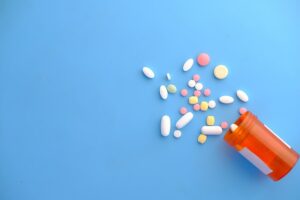Understanding the differences between fat-soluble and water-soluble vitamins is vital to ensuring we are doing everything we can to make sure our bodies are properly nourished. All of the vitamins we need on a daily basis can be described as either fat-soluble or water-soluble, which refers to how the vitamins are absorbed and stored in the body.
Knowing this distinction can help you determine when to take which vitamins, where to find them naturally, when to take them for maximum effect, and how much to take, as excessive amounts of certain vitamins can do more harm than good.
What Are 3 Differences Between Fat Soluble and Water Soluble Vitamins?
The biggest and most obvious difference between a water-soluble vitamin and a fat-soluble one is how they are absorbed and stored in the body. As the name suggests, water-soluble vitamins dissolve in water relatively quickly and are not stored in the body. Instead, once the necessary amount of vitamins are absorbed, the excess is released and flushed out.
Conversely, fat-soluble vitamins are absorbed by fat that then travels through our bloodstream, before ultimately being stored in the liver. While water-soluble vitamins are quickly absorbed with the excess being released, fat-soluble vitamins are slower to dissolve, and the excess is stored in the liver. This means that excessive amounts of fat-soluble vitamin supplements can cause problems such as vitamin toxicity.
This brings us to the next difference between fat-soluble and water-soluble vitamins, which is how often you need to consume them. The quick processing time of water-soluble vitamins means that they have to be taken regularly. Fat-soluble vitamins, meanwhile, stick around for longer amounts of time, meaning they do not to be taken as frequently.
The last difference between fat-soluble and water-soluble vitamins is just how many of each there are. Water-soluble vitamins include vitamin C and the eight B vitamins:
- Vitamin B1 (Thiamine)
- Vitamin B2 (Riboflavin)
- Vitamin B3 (Niacin)
- Vitamin B5 (pantothenic acid)
- Vitamin B6 (Pyridoxine)
- Vitamin B7 (Biotin)
- Vitamin B9 (Folate/folic acid)
- Vitamin B12 (Cobalamin)
In contrast, there are only four fat-soluble vitamins:
- Vitamin A (beta-carotene)
- Vitamin D
- Vitamin E
- Vitamin K
Each of these vitamins are found in different sources and have different functions, all of which are necessary for maintaining our bodies’ health. Depending on our diets, some types of essential nutrients are easier for us to consume throughout our day-to-day lives, while some may require a more conscious effort to make sure we are getting the right amounts.
Understanding Water-soluble Vitamins
Vitamin B1 (Thiamine)
Vitamin B1 is essential for maintaining nervous system functions. It can be found in foods such as pork, whole-grain or enriched breads and cereals, legumes, nuts, and seeds.
Vitamin B2 (Riboflavin)
Vitamin B2 also aids in cell development and function, and maintaining healthy skin and vision. This vitamin can be found naturally in dairy, leafy greens, and both whole-grain and enriched breads and cereals.
Vitamin B3 (Niacin)
Vitamin B3 is a part of an enzyme responsible for maintaining several functions like digestion, both cardiovascular and nervous system health, plus healthy skin, eyes, and hair. Lean meats, poultry, fish, whole-grain and enriched breads, vegetables, and peanut butter are all sources of vitamin B3.
Vitamin B5 (pantothenic acid)
Pantothenic acid helps with metabolising fats and protein, and can be found in a wide variety of foods, such as grains, eggs, meats, fish, poultry, legumes, dairy, vegetables, and mushrooms. Because pantothenic acid is so commonplace, deficiencies in this vitamin are quite rare.
Vitamin B6 (Pyridoxine)
Pyridoxine has several key functions, namely red blood cell production, as well as insulin and hemoglobin. You can find pyridoxine in meat, fish, poultry, legumes, and many vegetables.
Vitamin B7 (Biotin)
Biotin is key for breaking down carbohydrates into energy, as well as metabolizing fats and proteins. This particular vitamin is widespread as well, but can also be produced by bacteria in our guts.
Vitamin B9 (Folate/folic acid)
B9 a.k.a. Folate/folic acid is needed for red blood cell and DNA production. Leafy green vegetables, legumes, and orange juice are all sources of folic acid, although some enriched breads and cereal now include it as well.
Vitamin B12 (Cobalamin)
Vitamin B12 is central for both red blood cell production and nervous system health. Like the other B vitamins, vitamin B12 can be found in meat, fish, poultry, eggs, and dairy.

Vitamin C
The last of the water-soluble vitamins is vitamin c, an antioxidant. Vitamin C is famous for its immune system and wound healing support, but also helps our bodies absorb iron. This vitamin is only found in fruits and vegetables, particularly in citrus fruit.
Understanding Fat-soluble Vitamins
Vitamin A (beta-carotene)
Our bodies convert beta-carotene into vitamin A, which is needed for healthy skin, bone and tooth formation, vision health, and immune system health. Dairy is a reliable source of vitamin A, but so are leafy vegetables and eggs.
Vitamin D
Vitamin D also helps with bone and tooth development by helping our bodies break down and absorb calcium. Egg yolks, fortified dairy, and sunlight are all sources of vitamin D.

Vitamin E
Like vitamin C, vitamin E is an antioxidant that fights infections and promotes red blood cell health. Whole-grain breads, corn oil, and leafy green vegetables are solid sources of vitamin E, as are egg yolks and nuts.
Vitamin K
Vitamin K’s main purpose is being responsible for proper blood clotting, but it also aids in bone health.
Trusted Essential Nutrients
If you’re considering adding a vitamin supplement to your daily routine, it is important to consult with your doctor first, and make sure you are not putting yourself at risk of issues like vitamin toxicity or nerve damage.
Once you’re ready to get a handle on your wellness, Uscriptives will be ready to happily assist you along the way.











